Select Language
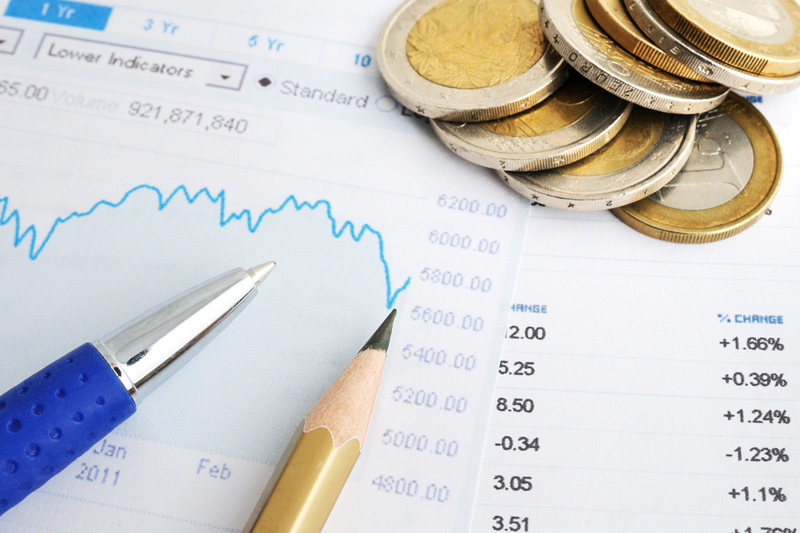
By Kevin Yao
BEIJING (Reuters) - Chinese government advisers will recommend economic growth targets for next year ranging from 4.5% to 5.5% to an annual policymakers' meeting, as Beijing seeks to create jobs and keep long-term development goals on track.
Five of the seven advisers who spoke with Reuters said they favoured a target of around 5%, matching this year's goal. One adviser will propose a 4.5% target, while the other suggested a 5.0-5.5% range.
The proposals will be made next month at the ruling Communist Party's annual Central Economic Work Conference that discusses policy plans and the outlook for the world's second-largest economy.
Reaching such targets would require Beijing to step up fiscal stimulus, the advisers said, given that this year's growth has been flattered by last year's low-base effect of COVID-19 lockdowns.
"We need to adopt expansionary fiscal and monetary policy to stimulate aggregate demand," Yu Yongding, a government economist who advocates for a growth target of roughly 5%, told Reuters.
"Corporate investment demand will not be strong as the confidence of companies has not recovered, so we need to expand infrastructure investment," added Yu, who also favours a budget deficit topping 4% of economic output.
The other advisers spoke on condition of anonymity due to the closed-door nature of the discussions. Top leaders are expected to endorse the target at the December meeting, although it will not be announced publicly until China's annual parliament meeting, usually held in March.
In October, China unveiled a plan to issue 1 trillion yuan ($139 billion) in sovereign bonds by the end of the year, raising the 2023 budget deficit target to 3.8% of gross domestic product (GDP) from the original 3%.
Chinese leaders have pledged to "optimize the structure of central and local government debt", suggesting the central government has room to spend more as its debt as a share of GDP is just 21%, far lower than 76% for local governments.
"We are stepping up fiscal policy support," said another adviser, to make the "difficult" 2024 target "achievable."
Monetary stimulus is expected to play a more limited role as the central bank remains concerned a widening interest rate differential with the West may further weaken the yuan and encourage capital outflows.
"The space for monetary policy could be bigger if we have greater tolerance for exchange rate fluctuations," said Guan Tao, global chief economist at BOC International and a former official at the State Administration of Foreign Exchange (SAFE).
REFORMS VS STIMULUS
China’s economy grew only 3% in 2022, one of its worst performances in nearly half a century. A Reuters poll in October showed that economists expect it to grow 5.0% in 2023 and 4.5% in 2024, although some have since raised their forecasts.
In 2022, President Xi Jinping laid out a long-term vision of "Chinese-style modernisation" at a key party meeting, with a goal of doubling China's economy by 2035 that government economists say would require average annual growth of 4.7%.
The stuttering post-COVID recovery has prompted many analysts to call for structural reforms that tilt the drivers of economic growth away from property and infrastructure investment and towards household consumption and market-allocation of resources.
Absent that, these economists warn, China may begin flirting with Japan-style stagnation later this decade.
Beijing has been trying to reduce economic reliance on property, channelling more resources into high-tech manufacturing and green industries, but has struggled to boost consumer and investor sentiment.
Policy insiders believe more fundamental changes, especially a revival of market-oriented reforms, are unlikely due to the political environment, under which the state has increased its control over the economy, including the private sector.
"If there is no consensus on reforms, we will have to use stimulus to drive growth, even though it will not be sustainable,” a third adviser said.
($1 = 7.2111 Chinese yuan renminbi)
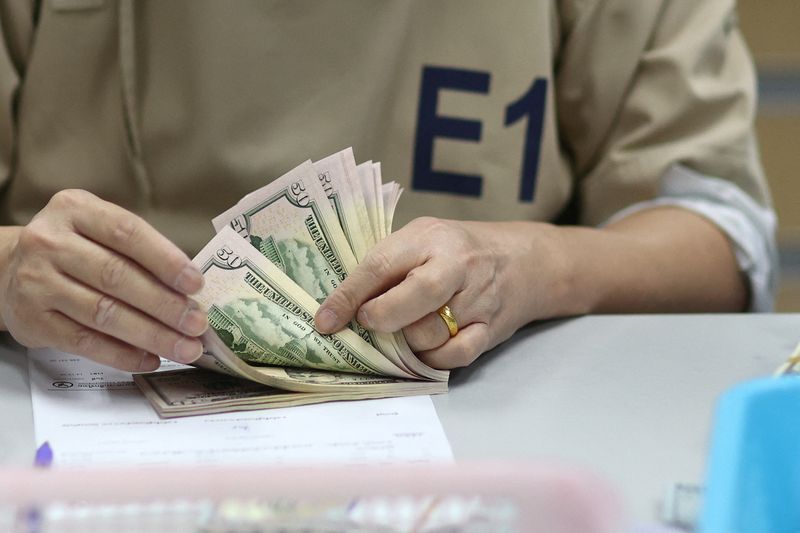
By Brigid Riley
TOKYO (Reuters) - The dollar index held around 2-1/2-month lows after minutes of the Federal Reserve's last meeting did little to dislodge market expectations that its monetary tightening cycle was over.
The Fed minutes showed the central bank would proceed "carefully" and that "all participants judged it appropriate to maintain" the current rate setting.
Fed officials agreed they would only raise interest rates if progress in controlling inflation faltered, reiterating recent comments by policymakers that left the door open for more tightening even as markets have moved to price in cuts from early next year.
"The release of the FOMC November minute did little to sway the opinion that the Fed have reached their terminal rate," said Matt Simpson, senior market analyst at City Index.
Markets are all but certain that the Fed will hold rates at their December meeting, while pricing in about a 30% chance of a rate cut as early as March, according to CME's FedWatch Tool.
The dollar index, which measure the greenback against a basket of currencies, was flat at 103.58, near levels last seen in early September but off an overnight session low of 103.17.
The euro last sat at $1.0912 after rising to its highest against the dollar since mid-August to $1.0966 on Tuesday.
Sterling was mostly flat at $1.2534, not far from a two-month high of $1.2554 touched overnight.
"We’re seeing signs that the dollar bearish move is running out of steam" and could be "due to bounce," Simpson said, adding that the greenback has a tendency to weaken and then strengthen around the time of the U.S. Thanksgiving holiday, which happens on Thursday.
U.S. Treasury yields, which have buoyed the dollar, have also tumbled from multi-year highs hit in October as investors ramp up bets that the Fed is done hiking rates following a slowdown in U.S inflation in the same month. Treasury yields slipped again overnight to hover around 4.40%, easing further pressure on the yen.
The Japanese yen advanced around 0.1% versus the greenback to 148.28, clinging to recent gains after ticking up slightly from as low as 147.155 overnight.
While speculation that the Bank of Japan could exit from negative interest rates early next year should help stabilise the yen, the Japanese currency still faces strong headwinds.
Recent U.S. data have pointed to the resilience of the world's biggest economy, bolstering the Fed's soft landing narrative.
U.S. "growth after the current rebalancing is still expected to outperform, which will support U.S. earnings and yields," said Tony Sycamore, market analyst at IG.
The dollar still holds "a significant yield advantage over the (yen)," he added.

TOKYO (Reuters) - Japan's government on Wednesday slashed its view on the economy for November in its first such downgrade in 10 months, as weak demand weighed on capital spending and consumer expenditure.
Authorities also cut their view on capital expenditure for the first time since December 2021, saying the pace of recovery was "pausing".
The new assessment by the Cabinet Office came after data last week showed the economy shrank in July-September for the first time in three quarters as demand waned.
"The economy is recovering moderately, although some areas showed stalemate recently," said the report issued by the Cabinet Office on Wednesday. It was the first time the government has cut its view on the overall economy since January.
"While business conditions and firms' earnings continue to improve, the strength of the corporate sector is not necessarily translating into wages and investment," an official at the Cabinet Office said.
"Domestic demand such as corporate investment and consumer spending lack strength," he said.
Although the government retained its assessment that consumer expenditure was "picking up" in November, inflation squeezed consumer goods spending, while spending on services such as eating out maintained an uptrend.
In a bid to soften inflation's hit to the economy, Prime Minister Fumio Kishida's government compiled this month a package of measures that will involve spending of more than 17 trillion yen ($113 billion).
The government expects the economy to continue to recover moderately but there are risks such as those from global monetary tightening and the Chinese economy.
Close attention needs to be paid to rising prices, the Middle East situation as well as financial market fluctuations, the report said.
($1 = 149.6200 yen)
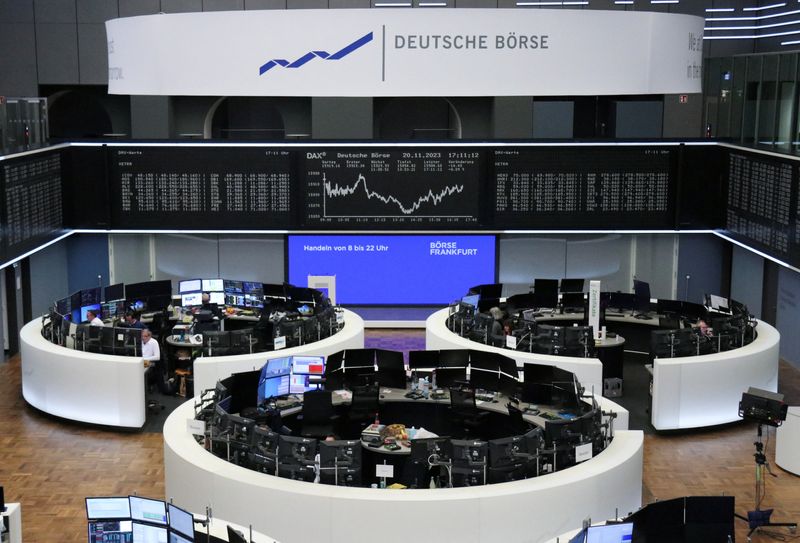
A look at the day ahead in European and global markets from Ankur Banerjee
Buoyed by a tech-fuelled rally on Wall Street, risk assets in Asia charged higher on rising expectations the Federal Reserve is done hiking rates and will likely cut early next year.
The worry remains that upcoming data might show not just a slowing U.S. economy but also an economy on the verge of a recession. But for now investors are looking the other way.
MSCI's broadest index of Asia-Pacific shares outside Japan touched a fresh two-month peak and is on track for its best monthly performance since January.
Lower Treasury yields have led the dollar broadly lower against most currencies, with a strong fix on China's yuan piling more pressure on the greenback. The dollar index, which measures the U.S. currency against six of its peers, fell to its lowest since Aug. 31.
Japan's Nikkei remained close to the 33-year high it touched on Monday. A Reuters poll showed analysts expect the index to continue its more-than-28% rally this year into 2024 to reach a three-decade high of 35,000 by end-June.
With the economic calendar bare in Europe, the rally may fizzle out although futures indicate European stock markets are set for a slightly higher open. Investors will turn their focus to minutes of the Federal Reserve's last meeting later in the day for cues on where rates are headed.
The spotlight will shine bright on earnings from artificial intelligence chip leader Nvidia (NASDAQ:NVDA), with expectation of another blockbuster revenue forecast.
Investors have cheered a better-than-expected U.S. earnings season and the results will be a major test for the AI-powered rally that has helped drive up the U.S. stock market this year.
Speaking of AI, the drama surrounding the future of OpenAI shows no sign of stopping. OpenAI named ex-Twitch boss Emmett Shear as interim CEO, while outgoing chief Sam Altman moved to backer Microsoft (NASDAQ:MSFT), in a surprise turn of events that clouded the future of the startup at the heart of the artificial intelligence boom.
Meanwhile, the chief of Hamas told Reuters on Tuesday that the Palestinian militant group was near a truce agreement with Israel, even as the deadly assault on Gaza continued and rockets were being fired into Israel.
Key developments that could influence markets on Tuesday:
Fed minutes, Oct inflation data for Canada, Nvidia earnings
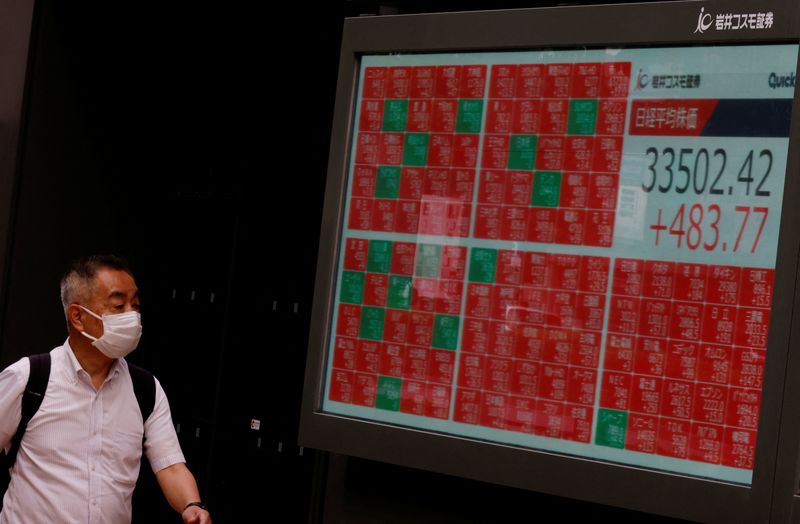
By Kevin Buckland
TOKYO (Reuters) - Japan's Nikkei 225 share average will continue its more-than-28% rally this year into 2024 to reach a three-decade high of 35,000 by end-June, according to analyst estimates in a Reuters poll.
All respondents forecast continued earnings growth, despite many also expecting the tailwinds from a weaker yen starting to dissipate with the Bank of Japan approaching the end of super-accomodative stimulus and the Federal Reserve tightening cycle peaking out.
The median forecast for the Nikkei's level in mid-2024 was 35,000, with responses ranging from 31,143 to 39,500, the Reuters poll of 10 stocks strategists taken Nov. 10-20 showed.
Japan's equity benchmark started this week by pushing to its highest level since March 1990 at 33,853.46 following a three-week winning streak.
The rally was partly driven by a robust earnings season, as the yen's drop to a one-year low beyond 150 per dollar during the period boosted exporters' profit outlooks and as companies passed on higher costs to consumers - something that would have been almost unthinkable pre-pandemic.
Masayuki Kichikawa, chief macro strategist at Sumitomo Mitsui (NYSE:SMFG) DS Asset Management in Tokyo, pointed to pent-up demand in both business investment and consumer demand, particularly for services, in forecasting the Nikkei to reach 39,500 in June and 40,900 by end-2024 - the most bullish forecasts in the survey.
"We are constructive mainly because we are optimistic about nominal GDP growth," he said. "There is still room for equity prices to reflect the better picture in EPS growth."
At the same time, Kichikawa and other respondents say the yen may have bottomed after pushing to the cusp of 152 per dollar earlier this month, amid expectations the Fed could begin cutting rates around May, while the BOJ may exit negative interest rate policy early next year.
That would mean some stagnation for equities in the latter half of next year, with the Nikkei still stuck at 35,000 at year-end, according to the median poll response.
IG's Sydney-based analyst Tony Sycamore is among the most bearish - one of only two forecasters predicting a decline for the benchmark in the latter half of next year, from 35,000 to 33,000.
"35,000 looks to be about the level where Nikkei gains line up with the timing of the BOJ getting rid of negative interest rate policy," Sycamore said.
"The Nikkei does still have the support of the BOJ being behind the curve," he added. "But at some point early next year, they will need to do what needs to be done, and that will not be a great outcome for equities."
(Other stories from the Reuters Q4 global stock markets poll package:)
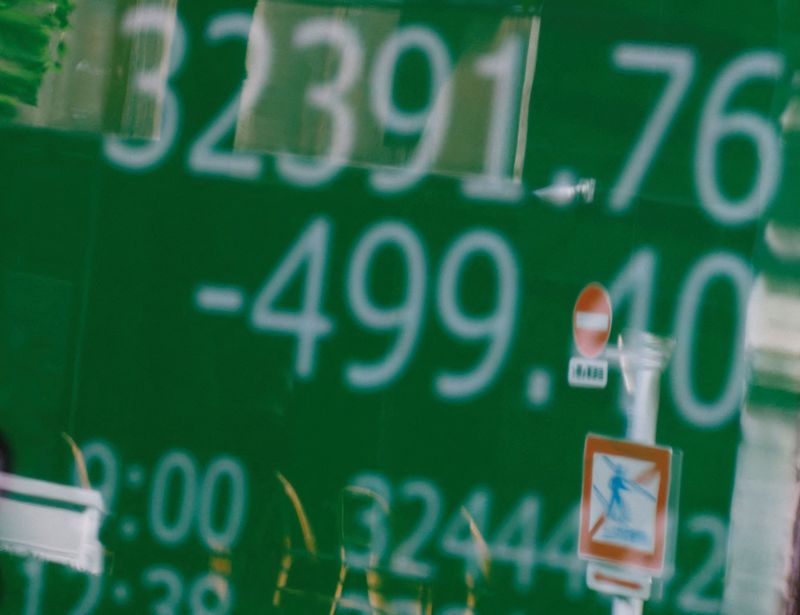
By Ankur Banerjee
SINGAPORE (Reuters) - Asian shares climbed to fresh two-month highs on Tuesday, boosted by a rally on Wall Street while the dollar languished near its lowest in two-and-a-half months on expectations the U.S. Federal Reserve is likely done with interest rate hikes.
MSCI's broadest index of Asia-Pacific shares outside Japan was 0.91% higher at 509.82 having touched 510.42, the highest since Sept. 18. The index is up 7% for the month and on course for its biggest monthly gain since January.
Japan's Nikkei eased 0.15% after hitting highs not seen since 1990 on Monday. The index is up roughly 28% this year, making it the best performing stock market in Asia.
China's blue-chip CSI300 Index was 0.66% higher, while Hong Kong's Hang Seng Index gained 1.25% as easing U.S.-Sino tensions lifted sentiment.
On Monday, Wall Street's three major stock averages rose with Nasdaq's 1% rally leading the charge as heavyweight Microsoft (NASDAQ:MSFT) hit a record high after it hired Sam Altman, who headed OpenAI until he was ousted late last week. [.N]
Investor focus on Tuesday will firmly be on earnings from Nvidia (NASDAQ:NVDA) and also minutes of the Federal Reserve's last meeting to gauge which way rates are headed.
Stock markets have broadly rebounded in November as a flurry of data that showed U.S. inflation might be easing has spurred bets that the Fed is done with monetary tightening and rate cuts may be on the way next year.
Traders have nearly fully priced in the likelihood that the Fed will keep interest rates unchanged in December, and some have started pricing in rate cuts as soon as March, according to the CME Group's (NASDAQ:CME) FedWatch tool.
Some remain cautious as economic data could change the monetary policy outlook.
"It only takes another strong inflation print or more consumer/labour market strength, and rates would head higher again," said Ben Bennett, APAC investment strategist for Legal and General Investment Management.
"My main concern is ... that we'll see some disappointing data around the turn of the year, which will focus attention on the risk of recession."
Trading is expected to be muted for much of the week ahead of Thursday's U.S. Thanksgiving holiday and a sparse data calendar for the week.
Rob Carnell, ING's regional head of research for Asia-Pacific, said the markets seem to have run out of internal momentum at the moment and may need an external stimulus to power the next move.
Treasury yields were lower in the wake of solid bidding in the $16-billion sale of 20-year Treasury bonds on Monday that suggested the market still anticipates inflation will decelerate and the Fed will cut rates next year. [US/]
The yield on 10-year Treasury notes was down 1.2 basis points at 4.410%, while the yield on the 30-year Treasury bond fell 2.1 basis points to 4.554%.
Lower yields kept the dollar on the back foot, with the dollar index, which measures the U.S. currency against a basket of six major currencies, down 0.058% at 103.37.
The Japanese yen strengthened 0.22% to 148.03 per dollar, having touched a seven-week low of 147.86. [FRX/]
The Australian dollar, often seen as a barometer of risk appetite, touched a three-month high of $0.65775 earlier in the session. The head of Australia's central bank said on Tuesday inflation will remain a crucial challenge over the next one to two years, in comments made two weeks after policymakers raised interest rates to a 12-year high earlier to tame high prices.
Oil prices eased, reversing the previous day's rally, as concerns over a slowing global economy outweighed the prospect of deepening supply cuts by OPEC and its allies such as Russia.
U.S. crude fell 0.05% to $77.79 per barrel and Brent was at $82.23, down 0.11% on the day. [O/R]
The oil market has dropped almost 20% since late September as crude output in the U.S., the world's top producer, held at record highs, while the market was concerned about demand growth, especially from China, the No. 1 importer of oil.
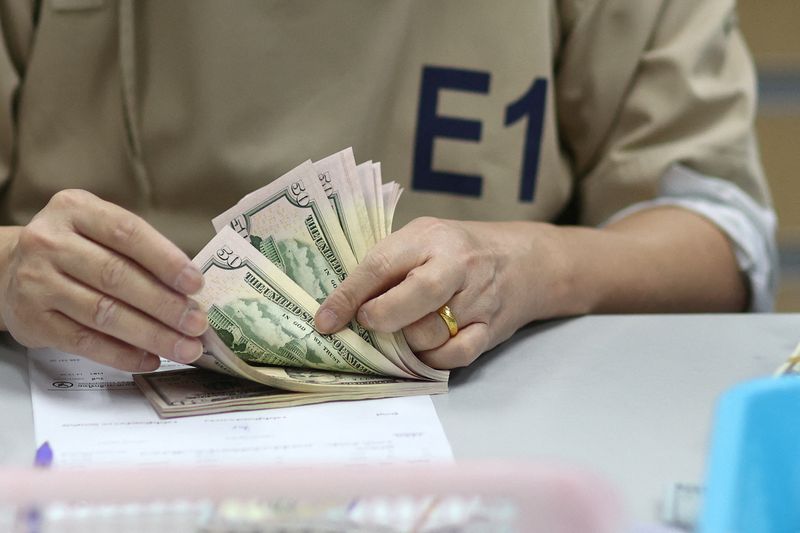
By Tom Westbrook
SINGAPORE (Reuters) - The dollar was on the defensive and trading by multi-month lows on the euro and a handful of other major currencies on Tuesday, as investors expect U.S. interest rates to fall next year and see that as a signal to sell the dollar in anticipation.
Moves were modest in early Asia trade, but the dollar index had dropped below its 200-day moving average on Monday as a rally in the yuan spurred another round of broad weakness.
The index, which measures the dollar against a basket of six major currencies, fell 1.9% last week alongside a big rally in U.S. Treasures, and lost a further 0.5% overnight to 103.44.
The euro touched a three-month high of $1.0952 on Monday, with a little help from European Central Bank governing member and reliable hawk Pierre Wunsch pushing back against market expectations for rate cuts as soon as April.
The yuan also hit a three-month high on the dollar on Monday as the central bank guided it higher. The Australian and New Zealand dollars had followed suit.
"The dollar continues to struggle, with the dollar index breaking below 104 on Friday and (now) below 103.5 ... as markets decide that the Fed is done," analysts at ANZ said in a note.
"Given how overvalued the (index) is, gravitational (pull)back to fair value is likely to be a strong theme if markets continue to take a relaxed view of where Fed policy is going."
On Monday, one U.S. recession gauge, the Conference Board's October leading economic indicator showed a decline of 0.8%, its 19th straight monthly fall. The next focus is on Federal Reserve meeting minutes due later on Tuesday.
Markets have all but priced out the risk of a further hike in December or next year, and imply a 1-in-4 chance of an easing starting in March. Futures also imply around 90 basis points of cuts for 2024, up from 77 basis points before a benign October U.S. inflation report shook markets.
In thin offshore trade on Tuesday morning, the yuan held its gains at 7.1640 per dollar. [CNY/]
The Australian dollar was marginally firmer at $0.6561, just below Monday's three-month high of $0.6564. The New Zealand dollar was steady at $0.6040. [AUD/]
Even the yen rallied to a seven-week high of 148.1 per dollar overnight and steadied at 148.3 on Tuesday.
The yen has been unloved this year, falling 11.6% on the dollar, as U.S. interest rates have climbed while Japan stuck to ultra-easy policy - opening a wide gap between government bond yields. That it has bounced almost 3% in a week has been eye-catching, especially since positioning data showed yen shorts actually jumped last week.
"We're in a dollar-unfriendly environment and after a long period where it reigned supreme any turn must come with at least temporary volatility," said Societe Generale (OTC:SCGLY) strategist Kit Juckes in a note pointing out the positioning shifts.
"Maybe it all adds up to the euro and sterling bounces running out of steam at some point, while the yen, AUD and NZD carry on for longer," he said, as shorts get squeezed.
The calendar is reasonably bare as the week heads towards the U.S. Thanksgiving holiday on Thursday. Besides the Fed minutes, U.S. housing and Canadian inflation data are due later on Tuesday, as is a speech from ECB President Christine Lagarde.
========================================================
Currency bid prices at 0000 GMT
Description RIC Last U.S. Close Pct Change YTD Pct High Bid Low Bid
Previous Change
Session
Euro/Dollar
$1.0945 $1.0941 +0.04% +2.15% +1.0947 +1.0942
Dollar/Yen
148.3700 148.3200 +0.04% +13.06% +148.3750 +148.2500
Euro/Yen
162.38 162.31 +0.04% +15.74% +162.4000 +162.2300
Dollar/Swiss
0.8844 0.8850 +0.00% -4.29% +0.8847 +0.0000
Sterling/Dollar
1.2508 1.2505 +0.03% +3.44% +1.2510 +1.2505
Dollar/Canadian
1.3726 1.3725 +0.01% +1.31% +1.3726 +1.3724
Aussie/Dollar
0.6560 0.6557 +0.06% -3.75% +0.6564 +0.6551
NZ
Dollar/Dollar 0.6039 0.6038 +0.02% -4.89% +0.6041 +0.6036
All spots
Tokyo spots
Europe spots
Volatilities
Tokyo Forex market info from BOJ
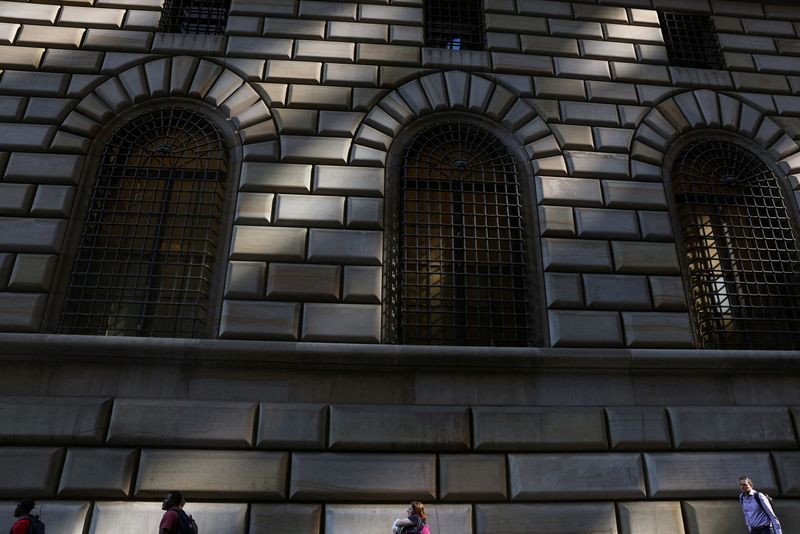
By Michael S. Derby
NEW YORK (Reuters) - Demand for new credit in the U.S. over the last year has declined and will likely stay soft in the future, according to a survey released on Monday by the New York Federal Reserve.
There was a "notable" decline in credit over the last year, with application rates at 41.2%, compared to 44.8% in 2022 and the pre-pandemic 2019 level of 45.8%, the regional Fed bank's quarterly Survey of Consumer Expectations Credit Access survey showed.
But even as the overall application rate for new credit declined among those surveyed, interest in applying for more credit card debt rose. The survey said that reading had hit 29% as of October and was 26% for 2023, compared to a 27.2% credit card application rate in 2019.
Over the next year, the proportion of people in the survey who plan to apply for more credit ebbed to 25.1% in October and 25.9% for the year as a whole. Last year, the proportion of those who planned to apply for new credit stood at 26.7%.
The report noted that expected decline in applications for credit extended to new credit cards, auto loans, mortgages and home refinancing. Respondents also see "significantly higher" prospects of future credit applications being turned down.
Earlier this month, a New York Fed report on total household debt levels during the third quarter found a 4.7% rise in overall credit card debt to $1.08 trillion, which it attributed to the strong economy and robust consumer spending.
Credit costs have increased markedly for borrowers on the back of aggressive Federal Reserve interest rate hikes aimed at slowing the economy to bring high inflation back to the U.S. central bank's 2% target. Those rate increases have hit the housing sector particularly hard and brought activity there down to low levels.
The economy, however, has continued to perform robustly and the prospect that activity will remain positive despite the Fed's monetary policy tightening has risen.
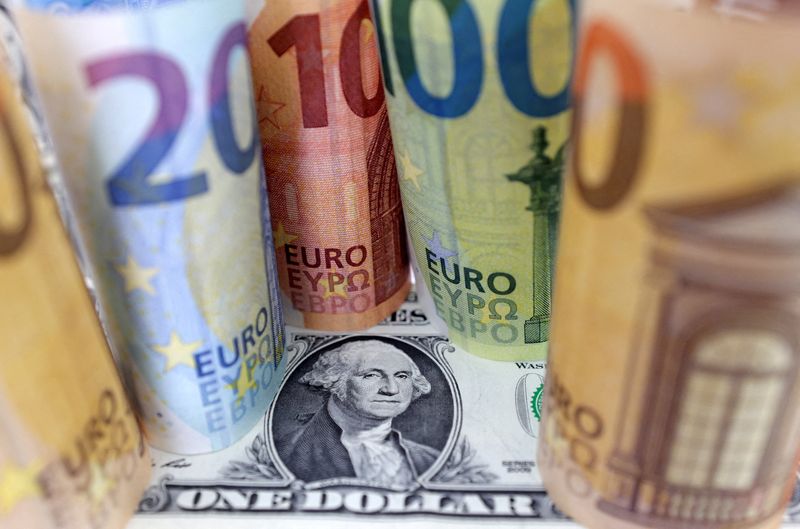
By Rae Wee
SINGAPORE (Reuters) -The dollar slid to a two-month low on Monday, extending a downtrend from last week as traders reaffirmed their belief that U.S. rates have peaked and turned their attention to when the Federal Reserve could begin cutting rates.
The yuan struck three-month highs in both the onshore and offshore markets, propped up by China's central bank, which gave the Australian and New Zealand dollars a leg up, as the two are often used as liquid proxies for the yuan.
The dollar index in Asia trade bottomed out at 103.53, its weakest level since Sept. 1, extending its nearly 2% decline from last week - the sharpest weekly fall since July.
Against the weaker greenback, the euro hit its highest since August at $1.09365, while the yen firmed at a one-month high of 148.68 per dollar.
Markets have priced out the risk of further rate increases from the Fed after a slew of weaker-than-expected U.S. economic indicators last week, particularly after an inflation reading that came in below estimates.
Focus now turns to how soon the first rate cuts could come, with futures pricing in a 30% chance that the Fed could begin lowering rates as early as March, according to the CME FedWatch tool.
"Market pricing for FOMC policy is likely to remain pretty steady, so the dollar should have very few catalysts to move it around this week," said Carol Kong, a currency strategist at Commonwealth Bank of Australia (OTC:CMWAY) (CBA). "If we do see risk appetite improve again, then the dollar can definitely weaken further."
Sterling edged 0.14% higher to $1.2480, flirting near a two-month peak, while the euro last bought $1.09185 ahead of flash PMI readings in the euro zone due this week.
Also due this week are minutes from the Fed's latest meeting, which will offer some colour on policymakers' thinking as they held rates steady for a second time this month.
"(The) FOMC minutes may be framed as a 'Fed pivot', thereby underscoring risk-on rallies favouring softer U.S. Treasury yields and U.S. dollar, alongside buying in risk assets," said Vishnu Varathan, head of economics and strategy at Mizuho Bank. "The upshot is that the FOMC minutes may overstate incremental dovish shifts and likelihood of the Fed's intended pivot signals."
The Japanese yen remained on the stronger side of 150 per dollar and was last 0.3% higher at 149.17.
Elsewhere in Asia, the yuan leapt to a more than three-month high against the dollar in both the onshore and offshore markets, as the central bank guided the unit higher and exporters rushed to convert their dollar receipts into local currency.
The onshore yuan rose 0.5% to an over three-month high of 7.1700 per dollar, while the offshore yuan similarly got a boost and jumped roughly 0.6% to an over three-month top of 7.1703 per dollar.
The Aussie was last 0.5% higher at $0.6546, having struck a three-month high of $0.6563 earlier in the session, while the kiwi gained 0.54% to $0.6025.
China on Monday left its benchmark lending rates unchanged at a monthly fixing, matching expectations, as a weaker yuan continued to limit further monetary easing and policymakers waited to see the effects of previous stimulus on credit demand.
The yuan, which has fallen nearly 4% against the dollar this year in the onshore market, continues to be pressured by a faltering economic recovery in China and as investor sentiment remains fragile.
"I think the theme of a soft Chinese economic recovery will persist for a while," said CBA's Kong.
"Until we get a more meaningful recovery in the Chinese economy, I think that will be a headwind for the (yuan), Aussie and the kiwi in the near term."

By Tetsushi Kajimoto and Kentaro Sugiyama
TOKYO (Reuters) - Japan's big employers are set to follow this year's bumper pay hikes with another round in 2024, which are expected to help lift household spending and give the central bank the conditions it needs to finally roll back massive monetary stimulus.
Early indications from businesses, unions and economists suggest the labour and cost pressures that set the stage for this year's pay hikes - the largest in more than three decades - will persist heading into next year's key spring wage talks.
The head of major beverage maker Suntory Holdings Ltd, for example, plans to offer employees average monthly pay hikes of 7% in 2024 for the second straight year, to retain talent in a tight labour market and offset rising inflation.
Meiji Yasuda Life Insurance Company intends to raise annual pay by 7% on average for about 10,000 employees from next April, while electronics retailer Bic Camera is set to raise 4,600 full-timers' pay by up to 16%.
"What's going on is a big paradigm shift away from deflation and towards inflation," Suntory Holdings CEO Takeshi Niinami, who also sits on Prime Minister Fumio Kishida's top economic advisory council, told Reuters.
"Given the fast-changing landscape, I believe those who move fast (with wage hikes) should become competitive."
Those announcements come as Kishida heaps pressure on companies to hike pay to offset the pain on households from rising living costs.
The back-to-back annual pay bumps would also provide Bank of Japan Governor Kazuo Ueda with one of the pre-conditions he needs to dismantle the extreme monetary stimulus of the past decade: sustainable wage growth.
"A combination of the chronic labour crunch and stubborn inflation will lead next year's wage negotiations to result in the same or even higher pay from this year," said Hisashi Yamada, labour expert and professor of Hosei University.
OECD data shows average wages have barely risen in Japan for about past 30 years as chronic deflation and prospects of prolonged low growth discouraged firms from raising pay.
The tide began to shift after supply constraints caused by the pandemic and the Ukraine war led to sharp rises in raw material prices, forcing firms to pass on higher costs to consumers.
With inflation having held above the BOJ's 2% target for more than a year, companies have faced unprecedented pressure to compensate employees with pay hikes to retain and lure talent.
A demand made this year by Rengo, Japan's largest trade union confederation, for pay hikes of "around 5%" resulted in average wage hikes of 3.58% among major companies. Rengo has said it will demand a pay hike of "5% or higher" next year.
Another major union UA Zensen, which covers service-sector workers and part-timers, said it would demand a pay 6% rise next year, in line with this year's demand.
Six out of 10 economists in a Reuters poll expect major firms' pay hikes in 2024 to exceed this year's.
"A combination of inflation, tight labour market and corporate profits will blow a tailwind to keep up the momentum for wage hikes," said Atsushi Takeda, chief economist at Itochu Economic Research Institute. "More and more companies are also able to pass on higher costs in supply chain."
UNEVEN HIKES
While lifting wages has been an elusive goal for Japanese policymakers for decades, recent cost-of-living pressures have added urgency to the task.
With his approval ratings plunging, Kishida has pledged to achieve another year of robust pay hikes and avoid the economic stagnation Japan saw in the late 1990s and early 2000s.
The prime minister last week called on the business community to beat this year's wage growth in 2024.
Kishida has offered subsidies and tax incentives for firms that carry out bold pay hikes and plans to allow loss-making SMEs who don't pay taxes to benefit from tax breaks later on. The premier also aims to give SMEs more bargaining power in negotiations with bigger clients.
Another year of solid wage growth would also help the BOJ pursue an end to its controversial monetary stimulus. Markets are betting the central bank could end negative interest rates by around April, when it gets more clarity on wages.
The BOJ's quarterly tankan business survey in December and wage talks between Japan's largest business lobby and Rengo in January may offer even earlier clues.
The key, however, would be whether wage hikes broaden to smaller firms and those in the regional areas.
A report by the BOJ's regional branch managers in October warned wage hikes remained uneven among sectors with many firms undecided on next year's pay increments.
In Saitama prefecture, north of Tokyo, Nitto-Seimitsu Kogyo Co., a small manufacturer of auto-part tools that has 113 employees, is raising wages by around 2% every year, but won't be able to pay more.
"I want to raise wages more for our employees to help our workers cope with high inflation but 2% is our limit," said factory boss Keita Kondo.
(This story has been corrected to remove the erroneous reference to pay hikes being given to 7000 employees in 2024, in paragraph 3)

